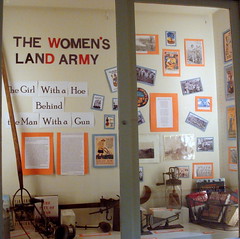Through our Archives, we discovered the following:
In the 1917-1918 Annual Report for Radcliffe College, the College President relates Dummer farming to patriotism:
“The most important patriotic work of our students was in farming. By an arrangement with Dummer Academy, a boys’ school in South Byfield, Massachusetts, a farm, planted by the boys in the spring, was taken over by Radcliffe College for the summer. When the girls came back to College and the boys went back to school, the boys became available for harvesting. Throughout the summer, the girls went and came, no squad staying for more than three weeks, though one or two individuals remained through the season. Besides caring for the Dummer farm, squads of our students worked for neighboring farmers who could not have picked and marketed their summer vegetables without such help. The good impression made by our young farmers wherever they went, their actual service to the country in furthering production of food, their evident health and happiness, and the new world that was opened to them in a vigorous out-of-door life have more than paid the College for the money that the experiment demanded. In this first year we expected no pecuniary profit and were quite prepared for a loss. The spirit shown by the girls and the education they received are profit enough. I believe that there are few uses of a summer vacation to which college girls can look back with such measure of satisfaction, and that no year will seem complete without a Radcliffe farm.”
--L.B.R. Briggs, President
We were intrigued. After all, it was the rents of the original farm which financed the Master Moody and his teaching in the Little Red Schoolhouse. So,this additional reference to farming sent us on a research hunt. We discovered the Women's Land Army and School Garden Army which supported the war effort at home during both of the World Wars.
Our display has pictures of the farm here on campus as well as farm implements of the WWI period which came from a farm in Freedom, NH and would have been of the type used here.

No comments:
Post a Comment